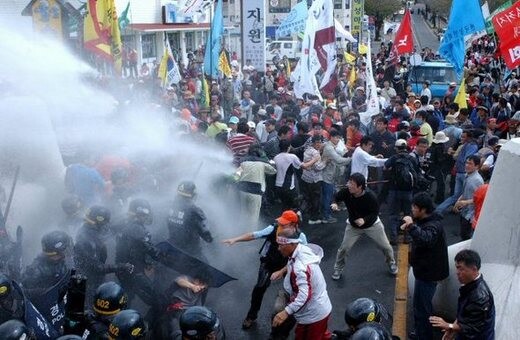hankyoreh
Links to other country sites 다른 나라 사이트 링크
Civic groups against gov't policy denied funding

The South Korean government has urged local governments to suspend subsidies to civic and social organizations campaigning against state policy, such as the free trade agreement (FTA) with the United States. Civic groups are understandably resisting the measure.
After the recommendation by the Ministry of Government Administration and Home Affairs (MOGAHA), according to an official of Yeonsu-gu in Incheon, the district has decided not to provide assistance to a civic organization because it campaigned against the FTA in August last year. The district has provided subsidies for the group's events since 2002, which have largely focused on calling for the reunification of the two Koreas.
Sim U-seung, an official of the district, said that the district got an order to tighten the management of subsidies for civic groups involved in activities against government policy. Such a decision was made at a city and provincial leaders' meeting presided over by the Government Administration and Home Affairs minister in November last year, added Sim. It was confirmed that the meeting's minutes contained a phrase about banning subsidies for organizations opposed to the ROK-U.S. FTA.
When the Seoul Metropolitan Government recently provided subsidies of 18.4 billion won (US$19.7 million) total to 162 projects and 153 organizations, it ruled out groups with records of illegal or violent protests. Kim Hyeong-dong, an official of the Seoul city government, said subsidies to the groups taking part in unlawful demonstrations will be retracted by the government.
In response, civic activists said that given that nearly all rallies against the ROK-U.S. FTA have been arbitrarily declared illegal by the police, the government are apparently targeting the civic groups opposing the FTA.
Im Yeong-mi, an official at People's Coalition for Media Reform, said the new measure is targeting groups opposing the FTA with the U.S. "How can the Participatory Government restrict subsidies for the groups for expressing views different from those of the government?'' he said.
The Ministry of Government Administration & Home Affairs, which secured a budget of 10 billion won to support nonprofit organizations this year, has attempted to exclude groups with records of participating in illegal or violent rallies or protests against government policy. For this, the MOGAHA received data regarding 66 cases of illegal or violent protests which took place in 2006 from the National Police Agency early last month.
The situation is the same in the provinces. The Changwon city council in South Gyeongsang Province on February 9 for the first time in the nation passed a bill about halting subsidies to organizations which had waged illegal protests. Gwangju city and North Gyeongsang Province are following suit.
In response, the North Gyeongsang branch of the Korea Advanced Farmers Federation (KAFF) issued a statement criticizing the measure as an attempt to control civic organizations using subsidies, and called it a return to former dictator Park Chung-hee's repressive Yusin government.
Lee Jae-geun, an official of the People's Solidarity for Participatory Democracy, said, "Each organization is taking legal responsibility for unlawful demonstrations. More than half of the government's assistance is being provided to pro-government organizations or groups under its influence. Now, the government is attempting to quiet voices opposing the government by using money, as well,'' added Lee.
The MOGAHA and regional governments earmarked 10 billion and 234.3 billion won, respectively, in the fiscal 2007 budget for civic organizations.
Please direct questions or comments to [englishhani@hani.co.kr]
Editorial・opinion
![[Editorial] Perilous stakes of Trump’s rhetoric around US troop pullout from Korea [Editorial] Perilous stakes of Trump’s rhetoric around US troop pullout from Korea](https://flexible.img.hani.co.kr/flexible/normal/500/300/imgdb/original/2024/0509/221715238827911.jpg) [Editorial] Perilous stakes of Trump’s rhetoric around US troop pullout from Korea
[Editorial] Perilous stakes of Trump’s rhetoric around US troop pullout from Korea![[Guest essay] Preventing Korean Peninsula from becoming front line of new cold war [Guest essay] Preventing Korean Peninsula from becoming front line of new cold war](https://flexible.img.hani.co.kr/flexible/normal/500/300/imgdb/original/2024/0507/7217150679227807.jpg) [Guest essay] Preventing Korean Peninsula from becoming front line of new cold war
[Guest essay] Preventing Korean Peninsula from becoming front line of new cold war- [Column] The state is back — but is it in business?
- [Column] Life on our Trisolaris
- [Editorial] Penalties for airing allegations against Korea’s first lady endanger free press
- [Editorial] Yoon must halt procurement of SM-3 interceptor missiles
- [Guest essay] Maybe Korea’s rapid population decline is an opportunity, not a crisis
- [Column] Can Yoon steer diplomacy with Russia, China back on track?
- [Column] Season 2 of special prosecutor probe may be coming to Korea soon
- [Column] Park Geun-hye déjà vu in Yoon Suk-yeol
Most viewed articles
- 1Nuclear South Korea? The hidden implication of hints at US troop withdrawal
- 2[Editorial] Perilous stakes of Trump’s rhetoric around US troop pullout from Korea
- 3‘Free Palestine!’: Anti-war protest wave comes to Korean campuses
- 4Korea likely to shave off 1 trillion won from Indonesia’s KF-21 contribution price tag
- 5In Yoon’s Korea, a government ‘of, by and for prosecutors,’ says civic group
- 6With Naver’s inside director at Line gone, buyout negotiations appear to be well underway
- 7[Photo] ‘End the genocide in Gaza’: Students in Korea join global anti-war protest wave
- 8Seoul getting its first-ever vertical farm
- 9‘We must say no’: Seoul defense chief on Korean, USFK involvement in hypothetical Taiwan crisis
- 10Behind-the-times gender change regulations leave trans Koreans in the lurch